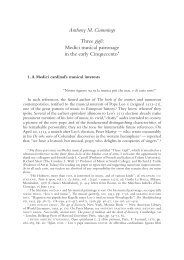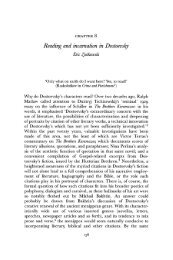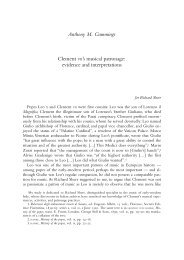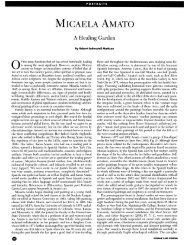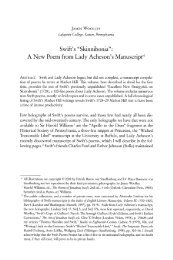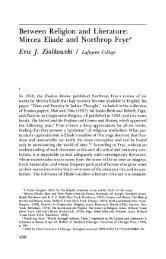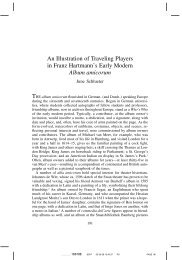courses of instruction - Lafayette College
courses of instruction - Lafayette College
courses of instruction - Lafayette College
Create successful ePaper yourself
Turn your PDF publications into a flip-book with our unique Google optimized e-Paper software.
terns and ecological analysis. Laboratory<br />
and lecture are tightly integrated. Stu<br />
dents develop a small-scale experimental<br />
model <strong>of</strong> a freshwater ecosystem, plus do<br />
individualized field-based investigations.<br />
Both oral and written presentation <strong>of</strong> find<br />
ings are required. Examples <strong>of</strong> some top<br />
ics include temporal change in biotic com<br />
munities, nutrient cycling and biota, and<br />
predator impacts on ecosystem dynamics.<br />
Strong emphasis on ecological design/<br />
analysis, identifying experimental varia<br />
tion, and self-directed learning. Prerequi<br />
site: Biology 231. Knowledge <strong>of</strong> statistics<br />
is highly recommended. Lecture/semi<br />
nar/laboratory. Offered in fall or spring<br />
semester. [S] Ms. Waters<br />
336. Evolutionary Genetics. This course<br />
addresses the genetic structure <strong>of</strong> species<br />
and populations (population genetics) and<br />
the evolution <strong>of</strong> genes at the molecular<br />
level (molecular evolution). Topics in<br />
clude: biochemical and molecular quanti-<br />
tation <strong>of</strong> genetic variation, molecular sys-<br />
tematics, and the molecular evolution <strong>of</strong><br />
structural and regulatory genes. In addi<br />
tion to lecture, students participate in the<br />
critical reading, presentation, and discus<br />
sion <strong>of</strong> recent primary literature in the<br />
field. Prerequisite: Biology 241 or 235.<br />
Lecture/seminar. Offered in fall or spring<br />
semester. [S] Mr. Label<br />
362. Investigative Molecular Biology.<br />
Structure, function, and regulation <strong>of</strong> eu-<br />
karyotic mitochondrial and chloroplast<br />
genomes are investigated. This research-<br />
intensive course utilizes phylogenetically<br />
diverse protists (unicellular algae) to an<br />
swer questions concerning organellar ge<br />
nome architecture. Emphasis is on student<br />
projects that involve either 1) genome size<br />
determination, library construction, and<br />
physical/genetic mapping <strong>of</strong> a mitochon<br />
drial or chloroplast genome, or 2) identifi<br />
cation, PCR amplification and/or cloning,<br />
and sequence analysis <strong>of</strong> a functional or<br />
ganellar gene. Prerequisite: Biology 261.<br />
Lecture/laboratory. Offered in fall semes<br />
ter. Staff<br />
BIOLOGY<br />
351-380. Special Topics. Dependent upon<br />
student and staff interests, one or more spe<br />
cialized areas <strong>of</strong> biology are examined each<br />
year. Prerequisite: Biology 101-102, and<br />
other <strong>courses</strong> as specified by instructor.<br />
Offered in fall and spring semesters. Staff<br />
390. Botanical Measurements. Employ<br />
ing techniques commonly used with bo<br />
tanical materials, this course surveys the<br />
algae, lichens, and bryophytes in the areas<br />
<strong>of</strong> anatomy, morphology, physiology, and<br />
ecology. Laboratory includes field collec<br />
tions, specimen identification, practice in<br />
aseptic techniques, physiological measure<br />
ments, and assessment <strong>of</strong> morphogenic<br />
changes. Prerequisites: Biology 101-102,<br />
and permission <strong>of</strong> instructor. Limited to<br />
12 students. Ms. Mineo<br />
401-404. Independent Research. A limit<br />
ed number <strong>of</strong> juniors and seniors may<br />
conduct an in-depth investigation <strong>of</strong> a<br />
particular topic in biology under the su<br />
pervision <strong>of</strong> a faculty mentor. Prerequisite:<br />
permission <strong>of</strong> faculty mentor and depart<br />
ment head. Hours by arrangement. Of<br />
fered in fall and spring semesters. Staff<br />
410. Senior Seminar in Animal Physiolo<br />
gy. A seminar on selected topics in animal/<br />
cellular physiology. A different area <strong>of</strong> cur<br />
rent research in physiology is con-sidered<br />
each semester. Prerequisites: Biology 251,<br />
and permission <strong>of</strong> instructor. Seminar/film.<br />
Offered in fall semester. [S] Mr. Holliday<br />
412. Senior Seminar in Vertebrate Biolo<br />
gy. Exploration <strong>of</strong> current topics in verte<br />
brate biology, particularly the relationship<br />
between morphology and behavioral ecol<br />
ogy. Emphasis is on primary literature.<br />
Prerequisites: Biology 213 or 218 or 314 or<br />
251, and permission <strong>of</strong> instructor. Offered<br />
fall or spring semesters. Mr. Young.<br />
414. Senior Seminar in Developmental<br />
Neurobiology. Discussion <strong>of</strong> current top<br />
ics in developmental neurobiology at cel<br />
lular, molecular, and genetic levels,<br />
through reading, discussion, and oral and<br />
written analysis <strong>of</strong> the primary literature.<br />
71




